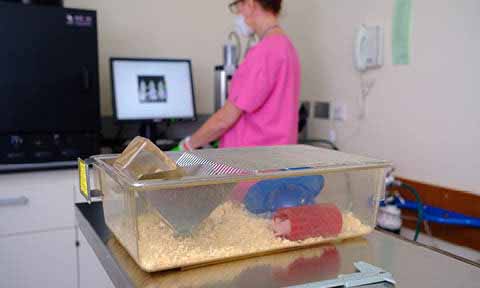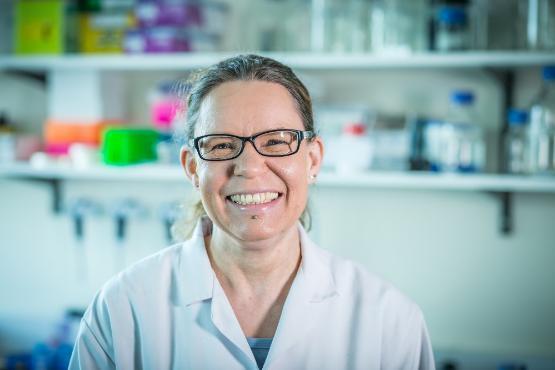Chronobiology, naked mole rats and why it’s time to stop putting the clocks back
“Naked mole rats are one of the coolest animals on the planet,” enthuses Dr Gisela Helfer, senior lecturer in Physiology and Metabolism in the Faculty of Life Sciences at the University of Bradford, which has two colonies of the rodents. “For a rodent of their size, you would expect them to live about two or three years but they live much longer. The oldest we know about is 40. They practically live forever. Plus, they are amazing because they are resistant to cancer and pain.”
Dr Helfer is a neurobiologist with a specialism in circadian rhythms, the natural process which regulates everything from sleep to blood pressure, digestion and much more. Her interest in naked mole rats is poignant because, in some ways, they are the exact opposite of us.
While modern humans are, for the most part, immersed in a 24-hour ‘on demand’ culture, most of us still wake up in the morning and go to bed at night. But activities such as looking at screens when we should be sleeping, getting up for a midnight snack, even working in dimly lit offices during the day, all disrupt what is called the circadian rhythm, a kind of natural internal clock that is, in turn, governed by the sun.

Here’s the kicker:
Unlike us, naked mole rats live their entire lives underground and so they don’t have the sun as a visual cue and yet they have a really strong circadian rhythm. Their longevity and resistance to disease are therefore of great interest.
“We all have this internal bio clock,” says Dr Helfer. “All living things have it, from plants to humans, even bacteria. It means you wake up in the morning and go to sleep at night. Even before you wake up, certain hormones are released by your body. So, your blood pressure goes up, the sleep hormone melatonin, which comes from your pineal gland, is shut down, your breathing becomes faster, your heartbeat picks up. All of this is governed by your circadian rhythm.”
In fact, as Dr Helfer explains, every function of the body has its own specific ‘time’ and when we deviate from these, things start to go wrong in other ways.
“Put simply, the body cannot do everything at once. If we have a good rhythm, we are in good health. If for any reason we disrupt that, through shift work or when you stay up longer at the weekend and sleep in longer… all those things put the body out of balance.
“If you get up in the middle of the night and eat when the body thinks it's fasting, the body has to adapt to that very quickly and that affects every other physiological function. If you do that once or twice it’s not a problem, but if you do that continuously, it can cause diseases. We have about 52 diseases now linked to circadian disruption.”
So (as the song says), it turns out the rhythm of life really is “a powerful thing.”
Links have already been discovered between our internal biological clock and body weight. Shift workers have higher incidences of obesity. Midnight snackers might not be able to properly digest the food they eat. Office workers don’t get the sunlight they need. It can even extend to road traffic accidents. The list goes on. As does the list of conditions linked to a poor circadian rhythm: obesity, type 2 diabetes, cardiovascular conditions, even some cancers.
Dr Helfer’s research is funded by a £100,000 Springboard study, specifically for early career researchers, backed by the Academy of Medical Sciences to look at links between the body clock and the hypothalamus, which regulates appetite.
“The circadian clock is fundamental. Between 50 and 70 per cent of genes in the body have a circadian rhythm. When everything works perfectly, we are in ideal health. Upsetting the rhythm creates a downward spiral of poor health. We live in a 24 hour society and our bodies are not meant for that. Most of us work in offices during the day where the light is not strong enough. Then at night, blue light from screens, which is more intense than sunlight, keeps us awake. It’s the worst thing you can do. Our rhythms are kept in tune by the environment and every morning our bio clock is reset. This is part of our evolution.
“If you imagine your body as an orchestra, with your brain as the conductor. As long as the conductor, the brain, has control over every instrument, the organs and tissues, your body works well. But when you disrupt that, say by eating in the middle of the night, the music loses harmony, the rhythm is disrupted.”
.jpg)
BSU Animal House
Experiments have shown that if one group of rats, which are active in the night, is given food in the day and another at night, it’s the day eaters which gain most weight, even though the calorie count is the same. The same is true for humans, if they eat more during the night when they are not supposed to eat, they gain more weight with the same calorie intake.
It’s not just late night snacking that has a dire effect on our health - the biannual tradition of moving the clocks introduced during the First World War has a deadly side effect, in particular an increase in fatal road traffic accidents. Dr Helfer believes we should do away with the clock change altogether.
“You are basically putting the entire country on jetlag twice a year,” she explains, pointing to a recent study by University of Colorado Boulder published in January 2020, which shows a six per cent spike in fatal car crashes in the week following the ‘spring forward’ clock change and points to worrying spikes in heart attacks, strokes and workplace injuries.
“The statistics are mind-blowing,” says the 45-year-old, who grew up in the mountain village of St.Johann im Pongau, near Salzburg, Austria. “Work related accidents increase in the week after clock change. If there’s a good economic reason, fine but otherwise, it’s just nonsense.”
She’s also a fan of teenagers starting school and sitting exams later in the day.
“In the UK, we start school at about 9am, which is good for teenagers, because they need more sleep. Throughout our life, our ‘chronotype’ changes and when you are in your teens, you generally have a later chronotype, which means you want to wake up later. When people get to 21/22, it goes back to being early again.”
A former ski and snowboard instructor in her youth (she says her parents put her on skis aged two), Dr Helfer studied biology and zoology at the University of Salzburg, Austria. During her master’s studies at the University of Salzburg, she investigated the neurobiology of learning and imprinting behaviour of Japanese quail chicks. It was this work which earned her an invitation to study at the Max Planck Institute for Ornithology in Andechs in Bavaria, where she initially worked on the hippocampal formation of migratory birds with Prof Ebo Gwinner,
It was here she developed a keen interest in chronobiology, including circadian rhythms and seasonality research, which led her to taking on a research assistant post at the same Institute to work on the circadian system of birds with Dr Roland Brandstaetter and Dr Andrew Fidler.
In 2004, she commenced her PhD with Dr Brandstaetter at the University of Birmingham, where she graduated in 2007 for researching the molecular characterisation of the circadian system in birds. After working as a teaching fellow at the University of Worcester, she took up a post as a research fellow at the Rowett Institute of Nutrition and Health, University of Aberdeen in 2009, working with Prof Peter Morgan. Her research at the Rowett focused on the seasonal neuroendocrine mechanisms regulating body weight and energy balance. In 2016, Dr Helfer was appointed to her first academic position as lecturer at the University of Bradford and she is now a senior lecturer in physiology and metabolism.
A mother of two with children aged 14 and 17, she’s an avid climber and still likes hiking.
Presently, she is focused on looking at a specialised group of cells in the brain called tanycytes, which reach deep into the hypothalamus and how they affect the regulation of body weight. She is also looking at a protein called chemerin, which is linked to fatty tissues and possibly some cancers.
“If we can understand this, we can simply tell people to just not get up in the night, to make them understand that this is evolution and how it works in humans. So, it’s something people can do rather than just taking a pill.
“If you are able to live a healthy life into middle age, that will have a positive impact on your later life. It’s the little things people can do to help themselves. If you have trouble sleeping, don’t look at your screen after 8pm or 9pm and then turn it off. If you have to get up in the night, don’t turn the light on.”
So how will our knowledge of circadian rhythms affect us in the future?
“After the discovery of circadian rhythms, some people thought ‘that’s it’ but things just keep getting more exciting because now we are starting to discover all kinds of links. So, my research into the bio clock and appetite regulation combines two fields. Normally, that would not happen, but I think it’s something which needs to happen more.
“For example, it could be that a scientist who is working on breast cancer does experiments in the day and another does them at night and they get completely different results. They might think it’s because of the drugs they are testing but it could be that the molecules they are looking at are only expressed during a specific time of the day and the effect they see is unrelated to the drug.
“I believe if the community of circadian researchers shout loud enough, we will be listened to.”

